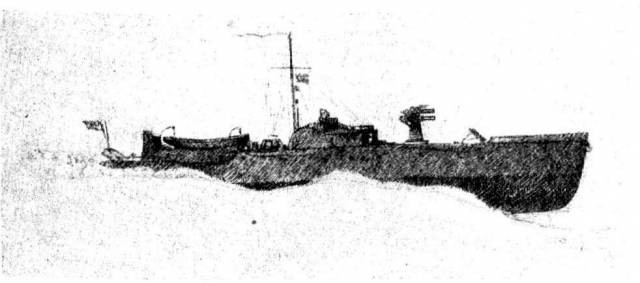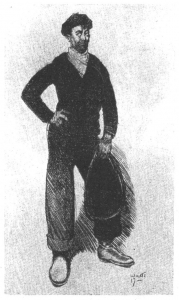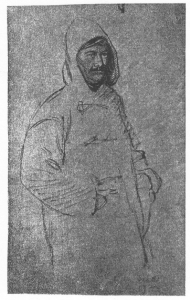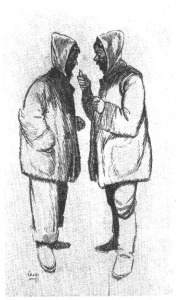"The Scented Trawler" by Lieutenant Arthur Watts, RNVR
With Illustrations by the Author
The Yachting Monthly, August, 1917
With Illustrations by the Author
The Yachting Monthly, August, 1917
As I sat at tea in the creaking, rolling cabin the hatch above my head lifted and the coxswain's head appeared.
"Floating mine ahead sir,'' he reported laconically, and closed the hatch again. And at that the tea things, as if animated by a common panic, lurched into my lap. I clambered up on deck.
Everything, however, has its compensations, and even if my tea was ruined here was at least some slight rift in the heart-breaking monotony of a four days' patrol. Nobody who has not known that monotony can appreciate it, or the pathetic interest with which one regards any floating object whatever. And a mine invariably means sport. Moreover, this was the best sort of mine. Not one of your British ones broken adrift and automatically become innocuous, but a big German fellow, as one could tell by his shape and silvery grey appearance. And so, full of faith and hope, we opened fire.
I believe we fired some thirty rounds first and last at that confounded machine, and at the thirtieth it bobbed and plunged unharmed. And here let me tell those who have never tried, that to hit a mine which shows no more than the top of a bald man's head, and that only visible half the time, is no easy matter. And when the gun platform is rolling to such an extent that the gunlayer has all he can do to hang on to the gun, the thing becomes almost impossible.
"Floating mine ahead sir,'' he reported laconically, and closed the hatch again. And at that the tea things, as if animated by a common panic, lurched into my lap. I clambered up on deck.
Everything, however, has its compensations, and even if my tea was ruined here was at least some slight rift in the heart-breaking monotony of a four days' patrol. Nobody who has not known that monotony can appreciate it, or the pathetic interest with which one regards any floating object whatever. And a mine invariably means sport. Moreover, this was the best sort of mine. Not one of your British ones broken adrift and automatically become innocuous, but a big German fellow, as one could tell by his shape and silvery grey appearance. And so, full of faith and hope, we opened fire.
I believe we fired some thirty rounds first and last at that confounded machine, and at the thirtieth it bobbed and plunged unharmed. And here let me tell those who have never tried, that to hit a mine which shows no more than the top of a bald man's head, and that only visible half the time, is no easy matter. And when the gun platform is rolling to such an extent that the gunlayer has all he can do to hang on to the gun, the thing becomes almost impossible.
At all events we were now at our last case of ammunition (which we dare not spend), and short of knocking the horns off with a boat hook there seemed no way of destroying it, as our mine sinking rifle was unfortunately defective. To make matters worse, the weather was by no means clear, and nightfall but a matter of a few hours.
Twelve miles away, in the neighbourhood of a certain lightship we could be certain of finding a destroyer; but the problem was, having found the destroyer, to make sure of finding the mine again or even to guard against the possibility of some vessel running into it in the interval.
To me at last came the solution, and I put it to C. as the only possible way out of our difficulties. He, with all possible speed was to return to the lightship and find a destroyer, while I, with the Coxswain to keep me company stood by the mine in the skiff till he returned.
There were risks of course too obvious to need comment, and at first C. was all against that plan; but at last, having no better one to produce, he reluctantly consented. It was no easy business to get the skiff over, but launch her we did eventually and the Coxswain and I tumbled in. We took with us a carafe of water, the top of a loaf of bread and a pocket compass - rather slight equipment, which later was rendered even slighter by the Coxswain treading heavily on the carafe of water and reducing it to powdered glass.
Poor old C. was far more concerned for our fate than we were. I think he had a mental picture of himself making a report to our Captain the next morning as to how he had come to lose his Sub-Lieutenant, Coxswain, dinghy and a full-sized German mine. But he tore himself away at last and was soon lost in the mist.
Twelve miles away, in the neighbourhood of a certain lightship we could be certain of finding a destroyer; but the problem was, having found the destroyer, to make sure of finding the mine again or even to guard against the possibility of some vessel running into it in the interval.
To me at last came the solution, and I put it to C. as the only possible way out of our difficulties. He, with all possible speed was to return to the lightship and find a destroyer, while I, with the Coxswain to keep me company stood by the mine in the skiff till he returned.
There were risks of course too obvious to need comment, and at first C. was all against that plan; but at last, having no better one to produce, he reluctantly consented. It was no easy business to get the skiff over, but launch her we did eventually and the Coxswain and I tumbled in. We took with us a carafe of water, the top of a loaf of bread and a pocket compass - rather slight equipment, which later was rendered even slighter by the Coxswain treading heavily on the carafe of water and reducing it to powdered glass.
Poor old C. was far more concerned for our fate than we were. I think he had a mental picture of himself making a report to our Captain the next morning as to how he had come to lose his Sub-Lieutenant, Coxswain, dinghy and a full-sized German mine. But he tore himself away at last and was soon lost in the mist.
I too, felt a little lost. I think we both did; for after all, to be adrift in the North Sea in a tin skiff in February with some tobacco, the top of a loaf of bread and nothing to look at but a confounded mine, is no cheery situation. However, there we were, and there we were likely to remain until somebody called for us. We had harder work to keep our position than I had expected, for while we were continually drifting to leeward with the wind, the mine, showing above the water scarcely at all, was stationary, and the prospect was not improved by the gradual creeping towards us of that wall of mist which already shut out the horizon. The minutes slipped by, until an hour and a quarter passed and one might reasonably expect C. to be well on his return journey. But not until another half hour had passed did we catch sight of him. And then, alas! he was a good two miles away, and a little grey smudge of grey with a tail of white foam that presently faded into the ever deepening mist, and we were left mournful and disconsolate.
It was a ridiculous position, and one that as every minute ticked away without result became more uncomfortable. Even if the mine had had anything to tie on to, such a proceeding would have been suicidal; and yet, if darkness fell and no help came, we knew we must infallibly part company with it in five minutes. And a pretty pair of fools we should look in the morning when (with luck) some craft picked us up and we had to explain our position.
But just as I was cursing fate, my luck and the war in general, there hove in sight (quite in the best style of the boys' books) a vessel. In the dim light she was at first a grey smear that resolved itself into a trawler with (to our intense relief) a useful looking three-pounder. On she came, heading straight for us, and presently I semaphored to her that we were standing by a mine. She slowed down at that, and, having sighted it, stopped her engines at about a cable and a half away. And then came our surprise. As we rowed to leeward of her in order not to interfere with her shooting we began to sniff, to stare at one another and sniff again.
It was a ridiculous position, and one that as every minute ticked away without result became more uncomfortable. Even if the mine had had anything to tie on to, such a proceeding would have been suicidal; and yet, if darkness fell and no help came, we knew we must infallibly part company with it in five minutes. And a pretty pair of fools we should look in the morning when (with luck) some craft picked us up and we had to explain our position.
But just as I was cursing fate, my luck and the war in general, there hove in sight (quite in the best style of the boys' books) a vessel. In the dim light she was at first a grey smear that resolved itself into a trawler with (to our intense relief) a useful looking three-pounder. On she came, heading straight for us, and presently I semaphored to her that we were standing by a mine. She slowed down at that, and, having sighted it, stopped her engines at about a cable and a half away. And then came our surprise. As we rowed to leeward of her in order not to interfere with her shooting we began to sniff, to stare at one another and sniff again.
Now there is one smell that is dear above all others to the heart of the homesick mariner--the indefinable fragrance that is sometimes borne on an off-shore breeze. Poppies and warm earth and wood smoke; none of these can one distinguish and yet is reminded of them all. But this! This overpowering stink! Not here the scent of wood-smoke and poppies, nor here the fragrance of the land. Rather the corruption of the London pavements, the reeking perfumes of music hall promenades and the sickly essences of barbers' shops. Parfume d'amour, Frangi-panni, Potpourri, the half forgotten, scarce noticed names swam into one's mind. Memories of hot marquees and perspiring fiddlers and stuffy concert rooms - all that exotic night life of big cities came back to one and ever again a wave of scent more pungent than its fellows would roll over one as it were, and almost stifle one.
And then the TrawIer's three-pounder suddenly loosed off and for a few moments all other interests were forgotten in watching her shooting.
Two shots, three overs and the sixth shot exploded the mine with a shattering roar that nearly knocked us off our seats. And I have no doubt that both the Coxswain and I were thinking that with such a steady platform we could have exploded it at the first shot.
The main business settled, the overpowering stink claimed our attention again. Rowing across to the trawler we clambered aboard. And there we found the solution of the mystery. On her main hatch cover and on her decks were little "sachets" of scent. Some were full, some were torn open, and here and there lay empty scent bottles. Near by stood the open case from which they had been taken. The full case it appeared had been picked up at sea, a pathetic enough relic of a good ship gone to the bottom. The trawler men with a quite unconscious humour had smeared themselves and one another with various perfumes and stood about the decks each drinking in the ambrosian perfume of the other. War gives birth to many strange freaks, but this struck us as the strangest! That these essences and perfumes designed for the frail fair should have come into the hands of these sons of Neptune!
We spent a lazy hour on the trawler sitting all the time on the windward gunwale--talking to her weather-beaten skipper--idly speculating on what had happened to C. And when at last we saw him tearing across our bows a mile away the dusk was falling. Poor C., I think he breathed a very full sigh of relief when he received a signal to the effect that we were safe and sound aboard, and it amused us somewhat and seemed a fitting tribute to our heroism that three other M.L.'s and a T.B.D. were busily hunting for us. But C.'s first remark when he got alongside was: "Good God! What a stink!"
And then the TrawIer's three-pounder suddenly loosed off and for a few moments all other interests were forgotten in watching her shooting.
Two shots, three overs and the sixth shot exploded the mine with a shattering roar that nearly knocked us off our seats. And I have no doubt that both the Coxswain and I were thinking that with such a steady platform we could have exploded it at the first shot.
The main business settled, the overpowering stink claimed our attention again. Rowing across to the trawler we clambered aboard. And there we found the solution of the mystery. On her main hatch cover and on her decks were little "sachets" of scent. Some were full, some were torn open, and here and there lay empty scent bottles. Near by stood the open case from which they had been taken. The full case it appeared had been picked up at sea, a pathetic enough relic of a good ship gone to the bottom. The trawler men with a quite unconscious humour had smeared themselves and one another with various perfumes and stood about the decks each drinking in the ambrosian perfume of the other. War gives birth to many strange freaks, but this struck us as the strangest! That these essences and perfumes designed for the frail fair should have come into the hands of these sons of Neptune!
We spent a lazy hour on the trawler sitting all the time on the windward gunwale--talking to her weather-beaten skipper--idly speculating on what had happened to C. And when at last we saw him tearing across our bows a mile away the dusk was falling. Poor C., I think he breathed a very full sigh of relief when he received a signal to the effect that we were safe and sound aboard, and it amused us somewhat and seemed a fitting tribute to our heroism that three other M.L.'s and a T.B.D. were busily hunting for us. But C.'s first remark when he got alongside was: "Good God! What a stink!"



